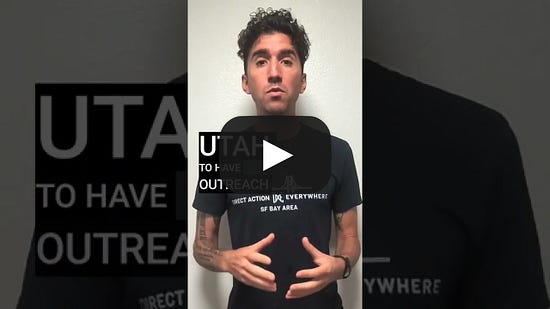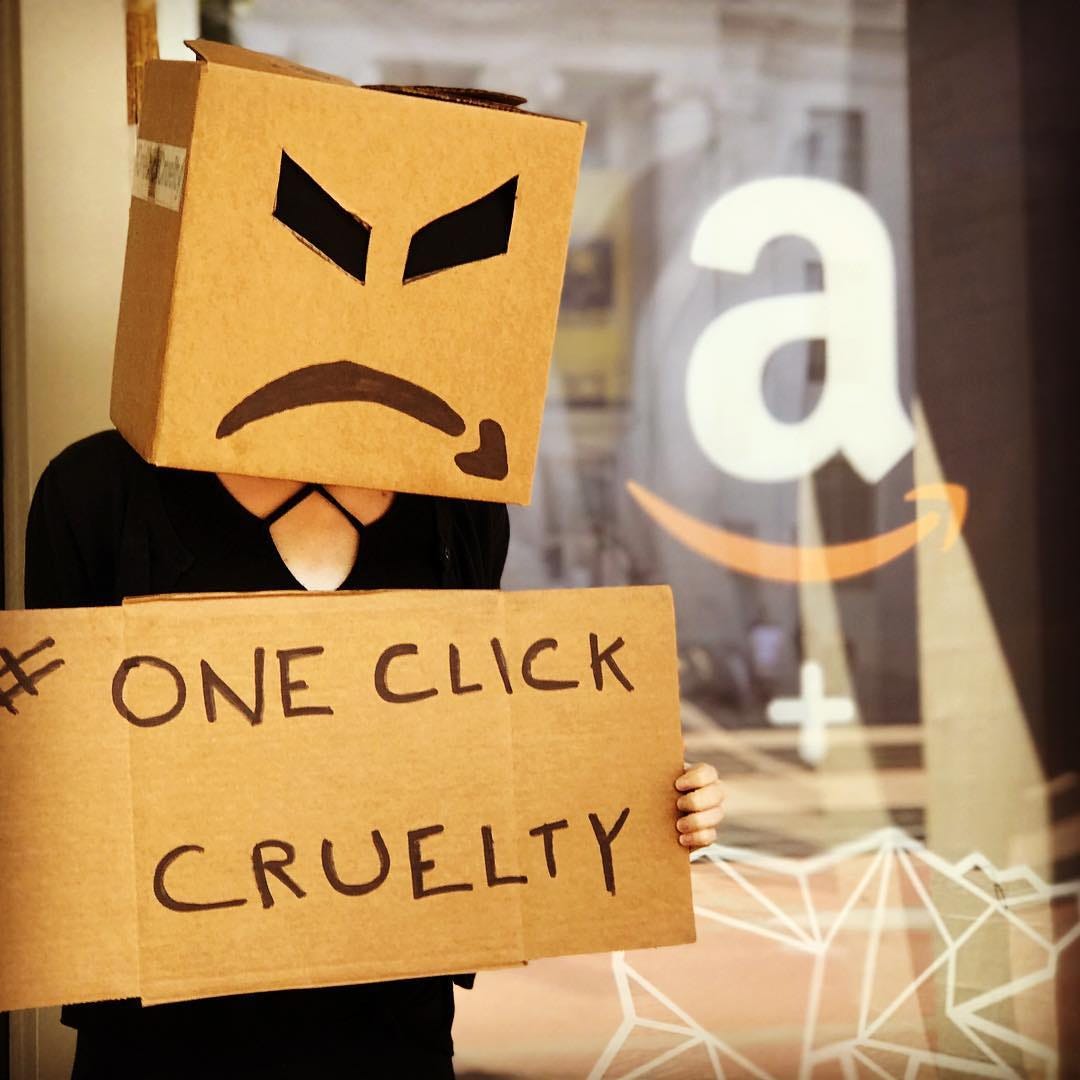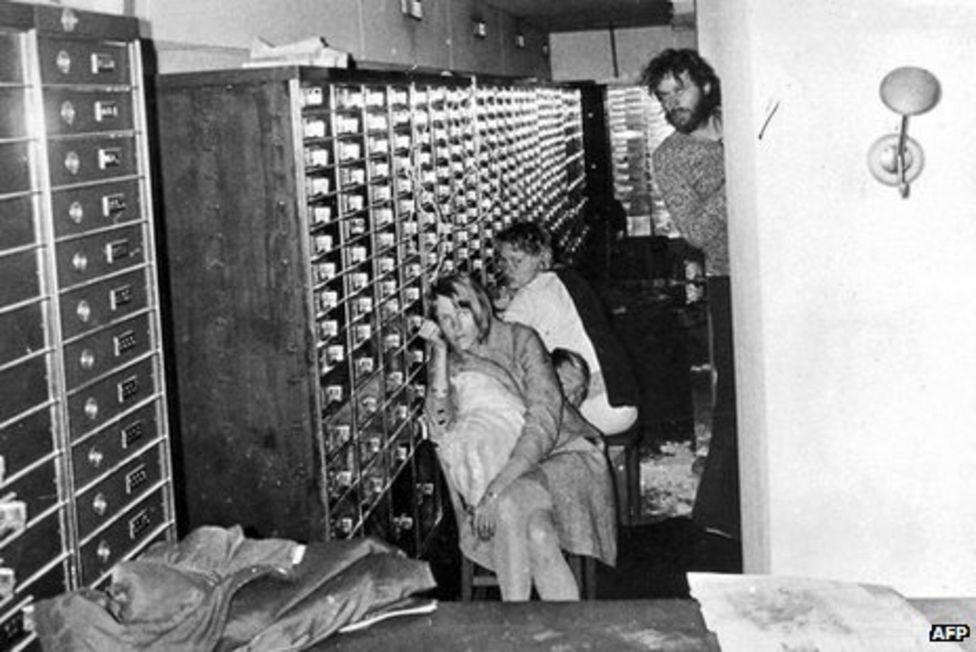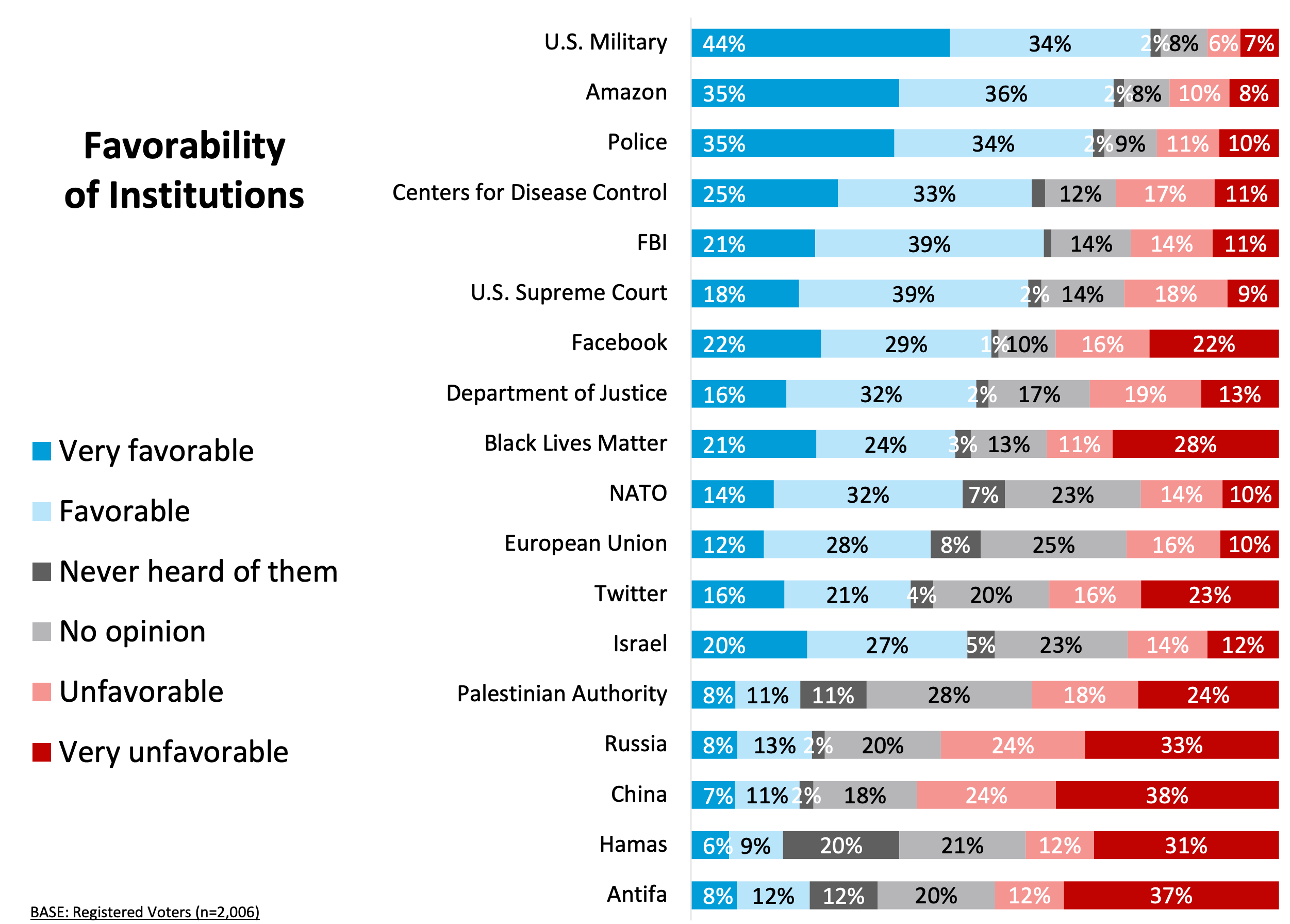|
How Mega-Corporations Cause Stockholm Syndrome
Corporations like Amazon and Smithfield are very popular in the very communities they are destroying. Could a psychological pathology be the cause?
| ||||||||||||
On July 23, a small group of animal rights activists gathered in Beaver, Utah – site of one of the largest pig farms in the world, Smithfield’s Circle Four Farms – to do what Americans have done since our democracy’s founding in 1776: exercise the right to free speech.
They stood on a public sidewalk, with leaflets in hand. They set up a table, after receiving approval from the nearby festival’s organizers, with virtual reality (VR) headsets that would allow people to walk (digitally) inside the walls of Circle Four. The advocates were hopeful, given that Smithfield recently announced the partial closure of the facility, that the residents would be open to their message. The abrupt layoffs, which would affect 25% of the employees in Beaver County, showed that Smithfield was treating all life — whether human or pig — as disposable.
But instead of sympathy for their concerns about a corporation that had polluted the air, potentially sickened local families, and even been implicated in human slavery and trafficking, the activists got a response that none of them anticipated:
Threats of violence.
A lawsuit filed by Direct Action Everywhere, the Utah Animal Rights Coalition, and a number of individual activists tells the story. As the Salt Lake City Tribune reports:
Vollmar and two other activists, with DxE and Utah Animal Rights Coalition, have filed a lawsuit alleging that the [Beaver] sheriff’s office violated their free speech rights. They’re also asking a federal judge to bar Beaver County and its officers from threatening to arrest or cite them as they return to the community to do outreach in public spaces in the weeks leading up to the trial.
“Like a bad B-movie, defendants literally told plaintiffs they were ‘not wanted’ in their county and to leave town,” attorney Karra Porter wrote in the lawsuit. “The only way for plaintiffs to follow defendants’ orders was to completely stop speaking about important public issues. This case is not a close call.”
The lawsuit also alleges that prior to Woolsey’s interaction with Vollmar, Sheriff Cameron Noel had leaned over the activists’ table and loudly told DxE member Alison Morikawa the activists would be “killed” if they didn’t stop, and threatened to press charges against them, the suit said. The sheriff was “presumably” referring to local citizens, the suit said.

I’ve faced significant opposition in my years as an activist. I’ve been assaulted at a demonstration against Chipotle, beaten inside a dog meat market, and charged by own government with over a dozen felonies for merely documenting and attempting to alleviate grotesque animal cruelty. But even I was shocked when I saw the video, and heard the accounts from the activists on the ground.
Threatened with death for merely speaking against a local corporation, and one that was in the process of devastating the local community?
But this is a phenomenon that occurs much more widely than is commonly understood. And overcoming it is crucial to those of us who care about social change.
I call it corporate Stockholm Syndrome. When a corporation captures an entire community, and makes it utterly dependent on the corporation for all forms of support, the people in that community will show support and even love for the corporation even when it works against their interests.
The syndrome comes in three stages. First, a corporation comes into a community offering immense short term benefits (but disguises the long-term social costs). Second, the corporation transforms the community to make it completely dependent on the corporation’s business. Third, the corporation asserts (falsely) that this dependency is inevitable; there is no escape from its tendrils.
All three of these stages unfolded in Beaver, Utah, leading local residents and authorities whose livelihoods were literally being undermined by corporation owned by a Chinese billionaire, with the support of one of the most oppressive governments on earth, to defend that same corporation with potentially lethal force!
Challenging this syndrome, in turn, may very well be key not just to fighting the power of Smithfield in Beaver County, Utah, but wresting destructive corporate control from the entire planet.
—
Stockholm Syndrome is a controversial psychological concept, in which victims of kidnapping develop a close bond to their captors — to the point of defending their captors against the people trying to rescue them from captivity. It’s controversial in part because it’s not well established in data and science. It would be highly unethical, of course, to experimentally kidnap people to determine if the phenomenon is a real one. And there are not enough real world cases of kidnapping to establish patterns.
Nonetheless there have been some historical instances where Stockholm Syndrome has been found. The concept originates from a fascinating historical event in Stockholm, in which a bank robber held 4 employees as hostages for six days at gunpoint. When the robber was ultimately arrested after the police used tear gas to force everyone out of the vault, the hostages did something utterly bizarre: they refused to testify against their tormenter, and instead raised money in his defense!
I’ve always been fascinated by the idea of Stockholm Syndrome, but given its rarity, it seemed more a curiosity than a genuine scientific finding. That’s one of the reasons the syndrome, despite popular notoriety, has never been classified as a genuine psychiatric disorder under the canonical manual of mental illness, the DSM.
But there is another instance of Stockholm Syndrome that is not rare. In fact, it’s practically a fact of modern American life. Corporations move in to communities and make themselves an “indispensable” part of the community’s life. This includes investment banks that are too big to fail, factory farms owned by foreign billionaires that can trigger an economic crisis here in the United States, even sporting teams that earn billions in public aid, on the grounds that the community needs them (while homeless people suffer on the streets). While stating publicly that the community “needs” the corporation, each of these corporations in fact has one and only one legal purpose: to maximize profits for its owners. And yet their propaganda is successful. Even when corporations are destroying communities, the communities still rush out to defend them.
The biggest example of this is Amazon, one of the largest corporations in the world, owned by one of the two richest men on the planet. Amazon has had devastating impacts on local jobs (an estimated 149,000 jobs lost nationwide), worker power (including a worker being ordered back to work when he was in the hospital suffering COVID-induced brain damage), and the environment (with a carbon-inefficient delivery system leading to massive greenhouse gas emissions). It is also one of the world’s great purveyors of the humane myth, falsely asserting that its massive meat supply (funneled through Whole Foods) is somehow good for the animals it tortures and slaughters. And yet, bizarrely, Amazon is one of the most popular institutions in the nation, falling behind only the military in earning 71% support in one Harvard study.
Amazon’s popularity is a case study in corporate Stockholm Syndrome. And the company has successfully gone through all three stages to induce the pathology in entire communiites.
First, it argues to local communities that there are immense short term benefits (while ignoring the long term impacts on worker power, the environment, or animals). When it was considering a massive new headquarters in NYC, the company claimed it would create 25,000 - 40,000 new jobs. The state and city quickly offered a shocking $3 billion in incentives for the new center. Left out of the public analysis is that same $3 billion could have been offered directly to 25,000 residents of NYC for a whopping $120,000 each — and that there were many potentially disastrous consequences of expanding Amazon in the city. One such scenario unfolded within a year, when employees were compelled to work in Amazon warehouses despite being sick with COVID-19.
The second stage was to transform the community to make it completely dependent on Amazon’s business. The COVID pandemic massively accelerated this process, with an astonishing 220% increase in profit — driven by a record $108.5 billion in quarterly sales — by mid 2021. Small businesses, of course, were wiped out. But it was ok, because Amazon was still there for us, right?
The final and third stage was to convince the local community that there was no way out of this increasingly dependent system. When grassroots activists pushed back against Amazon in NYC, the region’s most important progressive leaders, including then governor Andrew Cuomo, did something bizarre: they defended the company. Cuomo stated to the Times that the “state’s economic future” was put at risk by the opposition to Amazon. In short, Amazon had convinced Cuomo, and a large number of New Yorkers, who supported the deal, that they depended on Amazon for survival.
When these three stages have all passed, and corporate Stockholm Syndrome has been induced, it becomes extraordinarily difficult to wrest corporate control from the system, because the very people victimized by the corporation — including nominal “progressives” like Democrat Andrew Cuomo — begin to defend it. Even worse, they go on the attack against those who seek to point out the corporation’s devastating impacts. Cuomo, for example, publicly derided “a small group of politicians [who] put their own narrow political interests above their community.”
And this is why it is so hard, for example, for animal rights activists to make inroads in places like Southern Utah. When a corporation like Smithfield has induced Stockholm Syndrome, even some of the most direct victims of its misconduct will defend it. So what is to be done?
There are some lessons in the successful campaign to challenge Utah’s ag gag laws, and the efforts to implement a ban on new factory farms in neighboring Millard County.
The first lesson, as I argued in a recent blog post, is to ensure that our messaging reflects the values of the people we are trying to convince. This, after all, is how Amazon and Smithfield first earned corporate control: by speaking to the people in a way that reflected their values (jobs, economic growth, etc). One of the genius things that the Millard County activists did, in response, was to focus attention on values that were held even more dear. For example, they pointed out that Smithfield was a foreign company owned by a Chinese billionaire, and that one of Smithfield’s ads showed immense disrespect for the American flag, with children lying down over a symbol of American patriotism.
The second lesson in fighting corporate Stockholm Syndrome is to not just tell, but show, the community how to not just move on without their corporate captors. In my discussions in farm communities in Utah, when I focused exclusively on animal cruelty and corporate misconduct, the conversation generally went nowhere. But when I establish examples of regions or even entire nations that have thrived on an animal-free system of food production, and offer up a world where every worker has a well-paid job that does not involve violence against animals, people’s eyes often light up. It’s as if the cloud of corporate Stockholm Syndrome has been lifted.
The third and final lesson is the hardest: persevere through the setbacks and backlash. When dealing with corporate Stockholm Syndrome, like any entrenched system, progress is not going to be linear. You will face losses, such as the painfully close loss in Millard County’s ballot initiative to ban new pig factory farms. You will face backlash, such as the threats activists faced just a couple weeks ago. And you may even face efforts to imprison you, as Smithfield attempts to put me and my co-defendant Paul Picklesimer in a Utah jail. But the key thing, through it all, is to remember that, because corporate Stockholm Syndrome is grounded in a lie — that the corporation is good for the community — if we persevere we will eventually break its spell.
That’s part of what we hope to accomplish at trial, starting on September 9. But even if we “fail” in this case, and Paul or I end up in prison, we will win as long as we keep fighting through the backlash.
—
Here are some other quick updates and thoughts for the week.
We filed a crucial set of motions and reports this week in the Smithfield case, including a motion to call the Costco CEO to testify at our trial. CEO Craig Jelinek, one of the most powerful men in big business (and a beneficiary of corporate Stockholm Syndrome) will be called to speak about his interactions with me in the year prior to our investigation at Smithfield. His testimony will be crucial to establishing key elements in the trial, including that our intent in entering buildings at Circle Four Farms was to investigate Costco’s fraud (not to remove baby pigs). We expect the corporations to vigorously challenge this. Stay tuned for more. And don’t forget to register for the convergence if you want to come out and support us in Utah.
On the same week that we protested the FBI, for targeting nonviolent activists in progressive causes, the FBI raided Donald Trump’s home to search for confidential documents that were improperly detained. The protest was a good one, and if you want to hear my thoughts, check out 35:22 of this video. But it had the strange timing of occurring right after the FBI’s raid of Trump. I offered some skeptical views of the raid on Twitter, and I’d encourage everyone to also read this piece in The New York Times: Did the F.B.I. Just Re-elect Donald Trump? What do you think?

We’re having our usual Friday Night Hangout tonight at 7, for food and discussion of this blog post. Here’s the event page. Priya and I will be sharing some thoughts, and asking for yours. She’ll be talking about a provocative concept she shared on my podcast a few months back: Projection in Big Ag. Join us in person if you can, but we’ll also have a Zoom link that’s shared in the TSI WhatsApp chat. Shoot me an email if you want to join that chat.
Last but not least, PLEASE PLEASE PLEASE take one minute to fill out this week’s survey on what topic you’d like to read about, and discuss, next week. I depend on your feedback to figure out the most important things to write about. There are only 3 topics proposed, and it’ll take less than a minute to fill the survey out.
Thanks everyone! Until next time. (Incidentally, that may end up being sooner than you think, as I may start publishing on Monday and Thursday, rather than Tuesday and Friday, very soon.)
If you liked this post from The Simple Heart, why not share it?
| ||||||||||||



